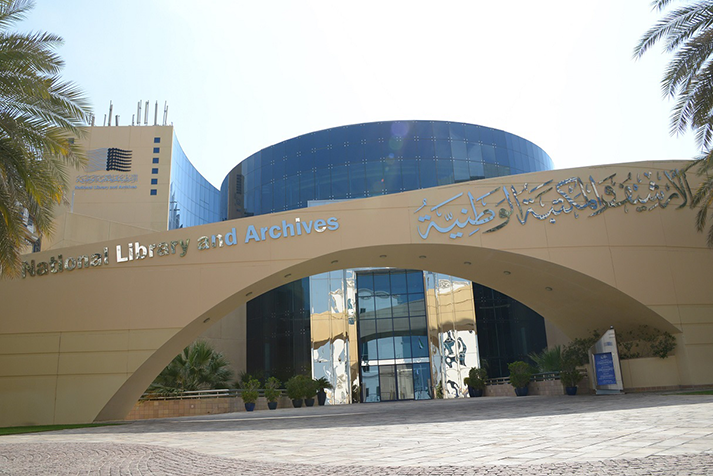
The National Library and Archives and the Arab Federation for Libraries and Information Conclude the 33rd Federation’s Conference hosted by Abu Dhabi
Participants thanked the UAE and its leadership for supporting and sponsoring the conference
The National Library and Archives and the Arab Federation for Libraries and Information Conclude the 33rd Federation’s Conference hosted by Abu Dhabi
The conference reviewed the experiences of the National library and Archives and major institutions in Oman, Libya, Sudan, Palestine... and others, in managing knowledge, contributing to knowledge economy and sustainable development.
The National Library and Archives and the Arab Federation for Libraries and Information concluded the 33rd Conference of the federation, which was hosted by the National Library and Archives in Abu Dhabi for 3 days under the theme: “Integration of National Information and Knowledge Institutions in the UAE: Libraries, Archives and Museums” The participants presented their thanks and appreciation to the United Arab Emirates and its leadership, the UAE National Library and Archives for the sponsorship and support of the conference and to all those who have contributed to its proceedings.
The recommendations of the conference focused on the importance of spreading informational awareness and culture among the Arab societies to ensure their transformation to information societies and the need to adopt effective programs in order to achieve this objective. The recommendations highlighted the need for the national libraries in the Arab countries and the public ones in particular to play their leading role in developing library practices, training their working staff members, laying down the necessary legislation, laws and standards for the Arab libraries, archives and museums and to follow-up their application and development; in order to keep abreast with the requirements of the digital age and enhance the ability of the Arab libraries, archives and museums to deal with the various crises they face by providing the necessary official and community support for their various programs and activities.
The recommendations also focused on the need to develop an Arab strategy to ensure the establishment of cooperation among the Arab libraries in general and the national libraries, archives centers and museums in particular. The recommendation stressed the importance of the role of libraries, archives and museums in achieving social responsibility and the goals of sustainable development in the Arab countries. Moreover there is a need to work on digitizing the Arab intellectual heritage published in various forms in order to make it available to researchers, and that attention must be given to the integration issue of the information and knowledge institutions in the Arab countries, the development of legislation, appropriate systems and tools in this field.
Recommendations also stressed the importance of information security in the Arab libraries, archives and museums to preserve their holdings and transfer them to future generations, in addition to the need to teach the integration of the information and knowledge institutions in syllabus programs of the library and information science and the specialized training courses in the field.
It is noteworthy that the conference held in the last two days 12 scientific sessions, which dealt with important topics and issues, such as: the inevitability of digital convergence for knowledge integration in order to build the collective memory for the future, knowledge integration and strategic alliances with emerging Arab information systems, and the museums of Kuwait and their integrative role as a modern education tool in addition to its role in preserving and documenting the history of the country, the foreseeing role of the national libraries in the era of information and communication technology. The Libyan National Library and its role in collecting and preserving the national heritage, the role of the National Library and Archives in the UAE in supporting scientific research among university students, and the role of national libraries, archives and museums in the smart cities, and the integration of the roles and tasks among the national libraries, archives and museums.
Some of the conference sessions were focused in measuring the level of awareness of library staff in the Egyptian academic libraries, the role of intellectual capital in supporting the integration of knowledge organizations, the role of the National Electronic Medical Library in the Sultanate of Oman in facing the information epidemic to create an information impenetrable society, and the role of the Sudanese libraries in supporting the Sudanese national development plans and visions.
The conference also shed lights on the role of building knowledge maps in supporting the sustainability of knowledge institutions, the role of modern technologies and artificial intelligence techniques in facilitating information services in cultural centers and the role of Non-fungible token technology (NFT) in preserving and disseminating documentary heritage and open data in King Fahd National Library.
Among the research papers the conference discussed were: comprehensive knowledge platforms and their role in supporting the UAE strategy in applying NFT technology in preparing museum manuscript directories, managing and investing digital assets in international and local museums, archive policies and legislation in banking institutions in Sudan, and the role of repositories in supporting the integration of information systems and tools, cooperation between national information institutions and their role in preserving heritage and the role of the National Library of Kuwait in preserving, documenting and protecting national heritage, government archive, the reality and hopes and the impact of the activities of national libraries in the Arab Gulf states in enhancing information awareness of beneficiaries.
On the third day of the conference, the sessions also focused on presenting the new publications of the Arab Federation for Libraries and Information, including standards and directories, and their importance.
The participants welcomed the announcement by the CEO of the Libraries Commission in Saudi Arabia that the 34th Conference of the Federation would be held next year in Saudi Arabia.
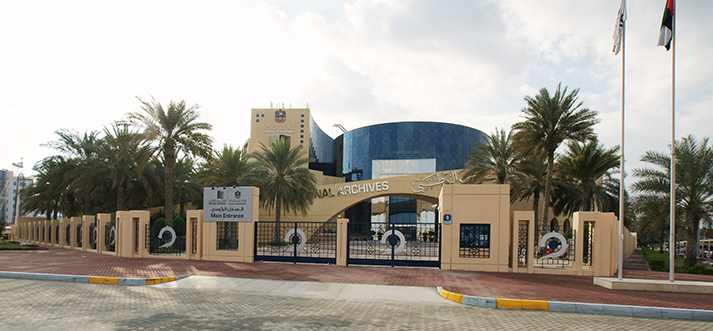
The Memory of the Nation pavilion with which the National Library and Archives participates in the Sheikh Zayed Festival 2021-2022
The National Library and Archives showcases its services in "Memory of the Nation" for visitors of Sheikh Zayed Festival
The Memory of the Nation pavilion with which the National Library and Archives participates in the Sheikh Zayed Festival 2021-2022, receives its visitors with a large panel displaying the services provided by the National Library and Archives to the researchers as well as archival units in the country's archival institutions, which include providing its publications, diagnosing and organizing archives, advising and diagnosing, and considering the destruction of useless documents.
In keeping with the mission of the National Library and Archives in "preserving the documentary heritage, to provide decision makers and the public with trusted information, and enhance civic spirit and national identity", the most prominent services listed in the panel which attracts visitors of the "Memory of the Nation" pavilion was the Archival Materials Request service, which involves providing archival materials such as photographs, historical documents, films and maps dealing with the history and heritage of the UAE and the Gulf region to government institutions and researchers from inside and outside the country.
Services also include the Diagnose of Government Archives, which involves sending an archiving expert together with some staff members of the Government Archives section to assess the status of the archives, in light of the articles of federal law No. 7 of 2008 and its executive regulations. In this context, the National Library and Archives is interested in preserving the UAE’s documentary assets; thus, it provides the service of archiving and document management advice to government agencies in accordance with international standards adopted in the archive organization and document management.
As a partner in the national upbringing of generations, the National Library and Archives provides national educational packages that include delivering national lectures, supporting curriculum, special groups and people of determination, and organizing conferences, seminars, and workshops that promote the educational process to deepen values of loyalty and belonging to the homeland among students and all segments of society.
The National Library and Archives provides the necessary technical advice and scientific guidance in the field of oral history and genealogy, which includes delivering specialized lectures and training workshops for researchers, academics and students. Furthermore, it supports government agencies, academic institutions and embassies with its publications which cover history, heritage and national values, making them available for electronic sale, and in libraries. All these publications have been evaluated by experts and specialists before being issued.
The National Library and Archives welcomes research, studies and working papers that examine the history, heritage and values of the UAE and refers them to the Scientific Committee, which in turn permits publication based on the quality of the method, scientific approach, accuracy and sound language.
The National Library and Archives organizes exhibitions of historical documents and photographs with which it participates in national events with a view to raise awareness of the UAE’s history and heritage, some of which are organized at the request of third parties.
At the Emirates Library, the National Library and Archives provides researchers, academics, students and those Interested in UAE history with ample sources of information dealing with history of the UAE and the Gulf, references and sources, university research, rare books, and Arab and foreign periodicals in paper and electronic forms.
One of the most important services provided by the National Library and Archives is the destruction of useless documents in government archives and agencies, based on the articles of the law prohibiting the destruction of any document in government agencies without the approval of the National Library and Archives, which designated a committee for destruction affairs headed by the Director-General.
The National Library and Archives continues its efforts to upgrade its services, providing them in accordance with the latest standards and the most advanced technologies, and within the framework of its mission, functions and objectives.

The National Library and Archives celebrates the 51st National Day and continues its cultural season 2022, proud of the prosperity that the UAE enjoys as it strides to the forefront
Reaffirming the pledge to follow the guidance of the wise leadership and continue excellence
The National Library and Archives celebrates the 51st National Day and continues its cultural season 2022, proud of the prosperity that the UAE enjoys as it strides to the forefront
The National Library and Archives celebrated the 51st UAE National Day at its headquarters. The event marked the occasion which confirms national cohesion and determination to continue the successful march. It also comes to reaffirm the pledge of loyalty to the wise leadership to exert efforts to further enhance the leadership position of the UAE.
His Excellency Abdullah Majid Al Ali, Director General of the National Library and Archives inaugurated the ceremony. In his speech, he emphasized that the Emirati people take pride in the National Day of the UAE, which is the home of excellence, and the oasis of creativity and innovation. He expressed his happiness to celebrate this dear occasion at a time when the UAE is booming and making greater achievements that will be recorded in history as evidence of the efforts and visions of our wise leadership. These accomplishments also prove the UAE people’s sincerity as they stride confidently into the future to be at the forefront.
His Excellency said that as we celebrate this precious national occasion, we remember the accomplishments of the late Founder and Builder Sheikh Zayed bin Sultan Al Nahyan and his fellow Founding Rulers to unify and to advance the homeland and its citizens. Driven by their efforts and sincere will, they made these glorious everlasting achievements which will be passed down to generations that love the homeland and take pride in belonging to it.
The Director General of the National Library and Archives added that as our nation rejoices at the National Day, which is an occasion to express feelings of love and loyalty to our dear country, he is pleased to extend his deepest thanks and appreciation, and best congratulations on behalf of everyone to His Highness Sheikh Mohamed bin Zayed Al Nahyan, President of the UAE, and to His Highness Sheikh Mohammed bin Rashid Al Maktoum, Vice President and Prime Minister of the UAE and Ruler of Dubai, and to their Highnesses the Sheikhs, Members of the Federal Supreme Council and Rulers of the Emirates, for their generous efforts in enhancing empowerment, innovation, development, progress and prosperity.
On this precious national occasion, His Excellency congratulated the UAE’s loyal people and its residents. He also congratulated the National Library and Archives and all its employees and affiliates advising them to exert more efforts as a token of gratitude to the nation.
The live performance of Abu Dhabi Police Music Band at the headquarters of the National Library and Archives in celebration of the National Day suggested grandeur, strength, and determination to continue the path towards further progress. A folklore troupe performed Al-Ayyala traditional dance which underscores the heritage position and reflects the pride the UAE’s people take in their environment and their folk arts.
Taking advantage of the celebrations of the 51st UAE National Day, the National Library and Archives carried on the activities of its cultural season 2022. The orchestra of Mawhibati program performed live at Sheikh Khalifa bin Zayed Auditorium of the National Library and Archives, and the audience enjoyed the various musical pieces.
As part of the activities celebrating the 51st National Day and the cultural season of the National Library and Archives, talented student Abdullah Al Nuaimi recited "The Falcon Story", which briefly reviewed the story of the establishment, development and prosperity of the United Arab Emirates.
The National Library and Archives praised the contributions of the members of the "Mawhibaty" program and thanked the Department of Education and Knowledge for sponsoring those talented youngsters of promising skills. At the end of the ceremony, all the creative participants were honored.

The National Library and Archives conducts a lecture on the importance of historical research which its promotes and advocates
The National Library and Archives conducts a lecture on the importance of historical research which its promotes and advocates
The National Library and Archives conducted a virtual lecture delivered to the University of Sharjah’s PhD scholars. The lecture tackled the importance of historical research and stressed that the National Library and Archives has a remarkable history in supporting academic historic research and providing postgraduate students whether of master's or doctorate degrees as well as general researchers with documented sources, photos and historical documents.
The National Library and Archives’ lecture was well received and followed by a large number of University of Sharjah Academics. Mrs. Fatima Sultan Al Mazrouei, Head of Historical Archives Section, and Mrs. Grace Kuruvilla, Senior Archives Specialist depicted the history of the National Library and Archives which was established upon the Founding Father and Builder Sheikh Zayed bin Sultan Al Nahyan’s directives in 1968 in implementation of his aspired vision and mission aiming at strategic tasks and objectives.
The lecture touched on the National Library and Archives’ role in preserving the memory of the nation for future generations, and its recognized efforts in conducting and presenting documented research studies on the history and heritage of the UAE and the Gulf region to enrich the cultural circles, and organizing specialized conferences such as the International Translation Conference, the UAE Oral History Conference, and the Library and Information Conference, apart from its participation in major events, festivals and book fairs in the UAE and abroad, and its keen interest in the collection of various information from its original sources, its documentation of the UAE history through newspapers and other sources, the preservation of the documents it acquires from the UAE local and Federal government agencies various archives, and its membership in major international bodies and organizations of its specialization, at the forefront of which is the International Council on Archives, of which it is an important and effective member.
The lecture also shed light on the National Library and Archives’ Historical Archives including: Qasr Al Hosn Archives, British, American, Dutch, Portuguese, and Ottoman Archives among other important international Archives.
The lecture finally focused on documents sources and their various access methods and acquisition sources including: the British Archives, the American Archives, the Postal Museum Archives, the Geographical Society Archives, the Durham University Archives in Britain, the Israeli Archives, the Portuguese Archives, the Bombay Archives, the Dutch Archives, and other sources which the National Library and Archives resorts to for archival material acquisition.
The two lecturers supported their speech with a large number of important documents and maps relating to the history of the UAE and the Arabian Peninsula region.
The lecture introduced the audience to the Arabian Gulf Digital Archive’s website, how to employ it in research to access its original and authentic historical documents. It also introduced them to the National Library and Archives’ recent publications, the Chronicles of the Sheikhs documenting Emirati history, the UAE renaissance highlighting place and human resources’ development.
The lecture discussed archival material acquisition methods and the National Library and Archives’ service provision channels. Finally, the lecture was concluded with students and audience great interaction through various inquiries. Academics and students alike commended the National Library and Archives’ great national role and services that help preserve the memory of the nation through acquainting the public with it.
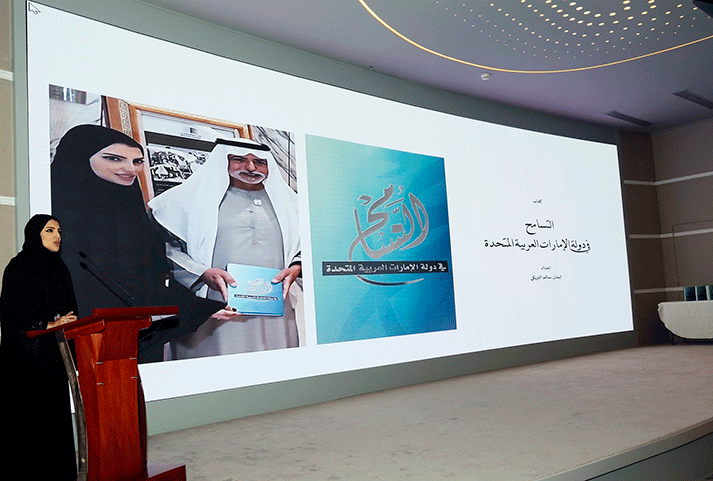
The National Library and Archives organizes a seminar on the UAE.. the nation of Tolerance and launches a book on adopted and exercised tolerance.
Concurrently with the International Day for Tolerance
The National Library and Archives organizes a seminar on the UAE.. the nation of Tolerance and launches a book on adopted and exercised tolerance.
Concurrently with the International Day for Tolerance, the National Library and Archives organized a seminar entitled: "The UAE.. Nation of Tolerance: Its Legacy, heritage, Happiness and Future", which tackled the UAE’s past and present to manifest a reflection of its true image, i.e. a tolerance haven and a global model of coexistence and fraternity, embracing more than 200 nationalities living happily and peacefully on its hospitable land.
The seminar began with Sheikh Zayed bin Sultan Al Nahyan’s quote on tolerance: "Tolerance is an essential duty, if God Almighty; the greatest Creator forgives, how can we; as humble human beings of his creation possibly not forgive?!.".
His Excellency Abdulla Majed Al Ali, Director General of the National Library and Archives began the seminar with an opening speech in which he stressed that tolerance to the Late Sheikh Zayed bin Sultan Al Nahyan was a key human value and an essential strategy approach, as he believed that tolerant societies achieve peace, security, stability, sustainable development, advancement and their aspired objectives and goals. He also added that: “The UAE’s wise leadership has always recognized the significance of this value and promoted its culture among its people”.
His Excellency stressed that the UAE population indicate that it advocates and promotes the values of tolerance, peace, safety and cultural pluralism, as it hosts more than 200 world nationalities who enjoy a respectful decent living, and the UAE laws grant them all respect and equality. Thus, tolerance or openness to others and cultural dialogue are adopted approaches that bridge any communication gaps with the world people or Countries.
His Excellency praised the book entitled "Tolerance in the UAE" issued by the National Library and Archives in celebration of this occasion.
Dr. Aisha Bilkhair, National Library and Archives’ Research Advisor and Head of the Tolerance Committee, then tackled "Tolerance in Emirati Heritage", stressing that tolerance is deep-rooted in the Emirati society, and that it was always exercised among people through their various dealings, behaviors, customs, traditions and ways of life. many examples have been provided in this connection, namely: tolerance in conflicts, in naming places, in hospitality, among many others.
Mr. Hassan bin Thalith, a member of the Tolerance Committee at the National Library and Archives, depicted tolerance from a historical perspective as he stressed that tolerance is not limited to the religious aspect only, as there are social, political, cultural and other aspects of tolerance.
Mr. Bin Thalith cited examples of tolerance in Emirati society from what transpired in the councils or the Majlises of Sheikh Zayed bin Sultan Al Nahyan, which exhibited all types of tolerance, and this was witnessed by Foreign or western historians and orientalists, such as: Julian Walker, Wilfred Thesiger, Edward Henderson... who all praised the democracy and dialogue freedom exercised in these councils.
Mrs. Madya Al-Mhairbi, a member of the Tolerance Committee, stressed in her speech on: Tolerance.. Happiness and Future, that we must be tolerant to achieve our goals, and that tolerance must be a way of life, as the tolerant person benefits the most, since tolerance turns him into a positive, optimistic, and benevolent character, self, nation and society loving.
The ceremony was concluded by launching the book entitled: "Tolerance in the United Arab Emirates" prepared by Mrs. Iman Salem Al Breiki, Senior Researcher at the National Library and Archives. Mrs. Al Breiki shared her experience in preparing this publication that documents the virtue of tolerance, which made the UAE a global model and a haven of tolerance.
Mrs. Al Breiki noted that the book consists of three chapters, namely: Tolerance and its importance, the UAE is a nation of tolerance and coexistence, and the UAE political leadership’s quotes on tolerance.
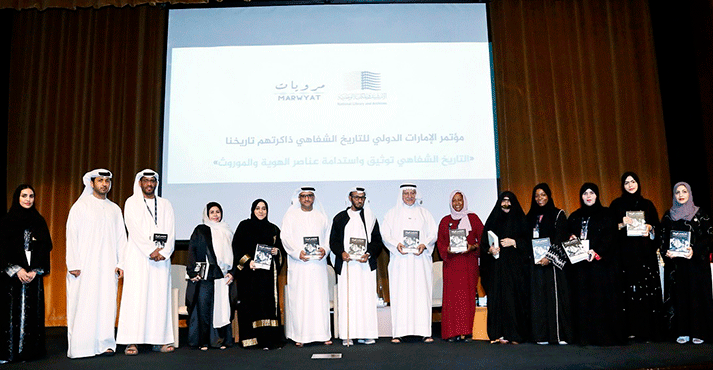
The National Library and Archives Organizes an International Oral History Conference
Under the theme of Their memory Our history, and with the aim of documenting and sustaining identity and heritage elements
The National Library and Archives Organizes an International Oral History Conference
The National Library and Archives organized the UAE International Oral History Conference under the theme of Their Memory Our History: Oral History Documenting and Sustaining Elements of Identity and Heritage. Participants in the conference included specialists, experts, researchers, those with distinguished experiences in oral history and senior local narrators whose memories enriched the third volume of Their Memory is Our History, which was launched at the conference.
The National Library and Archives attaches great importance to oral history, as it is essential to take advantage of narrators who witnessed the events before and after the union to document history, since eyewitnesses are more credible and reliable than earwitnesses.
His Excellency Abdullah Majed Al Ali, Director General of the National Library and Archives, inaugurated the conference with a speech in which he welcomed the narrators, participants, and guests of the conference. He stressed the importance of this conference because it shed light on the significance of oral history as a reasonable and effective tool of recording and preserving memory and bygone events.
Oral history constitutes an important source in the history of nations and peoples. Those who witnessed the historical events can give true account of them since they are imprinted in their memories.
His Excellency said that as soon as the National Library and Archives opened the way for senior citizens to document their memories in its records, they realized with their sense of patriotism that this is a national duty. Thus, they welcomed the NLA’s teams of experts and specialists who reached out to them across the UAE.
He pointed out that Article (4) of Federal Law No. 7 of 2008 has entrusted the National Library and Archives with the task of collecting, documenting, and preserving oral history material and making it available in the relevant scientific manner.
The Director General of the National Library and Archives expressed his happiness with the NLA’s achievements, as it compiled more than 900 interviews providing content for its publications which enrich the Arab library.
Dr. Aisha Belkhair, Research Advisor and Head of the Oral History Team at the National Library and Archives delivered a speech in the UAE International Oral History conference. She stressed the importance of the oral narrative which serves as a bridge between the past and the present through which our grandparents and parents’ traditions and values are passed down to the younger generations. It also acquaints researchers with the past to enrich historical research and enhance the harmony between civilizations and cultures. This contributes to the sustainability of heritage and motivates generations encouraging them to preserve the "treasures of the Emirates" and its living memory.
She praised the efforts of the conference guests, including narrators, participants, experts and researchers. She also applauded the efforts of the oral history team at the National Library and Archives, and the support they receive from its senior management.
Participants and guests of the conference witnessed the launch of the third volume of Their Memory, Our History, published by the National Library and Archives, in the presence of many narrators involved in its topics.
The conference witnessed positive interaction between the audience and the speakers: Mr. Mohammed Saif Al-Nayeli Al Shamsi, Mr. Siddiq Al Khaja, and Mr. Mohammed bin Salem bin Kabinah Al Rashedi. They spoke about the importance of preserving heritage the need to sustain it for successive generations, and the role of the UAE community in spreading tolerance and peace.
In the first session of the conference, moderated by Dr. Aisha Belkhair and entitled Oral History and the Future Memory, Dr. Mohamed Hassan Abdel Hafez, Assistant Professor of Folk Literature at the Higher Institute of Folk Arts, spoke about the importance of oral history in preserving identity. He also praised what the National Library and Archives offers within the framework of the oral history project in which the United Arab Emirates is interested with a focus on folklore and heritage, which the world did not incorporate in the priorities of the oral history.
Then, Mr. Jumaa Bin Thalith Al-Humairi, Director of Heritage Projects at the Emirates Diving Association, spoke about his experience in collecting oral history. He pointed out that the researcher in the field of oral history must have the ability to interact with the elderly narrators and the skill to steer the conversation to obtain the sought-after information and memories. He touched on some amusing incidents which he experienced while conducting field interviews and documented in his books.
Prof. Saleh Al-Dossi Al-Zahrani, Graduate Studies Professor at the Department of the Education Principles and Management of the University of Jeddah, discussed data collection tools at the end of the first session. In his research paper, he shed light on new software that can be used in preserving oral history and the importance of dealing with oral history as a science to which scientific research methods are applied. He gave a detailed practical explanation of the development of scientific research methodologies in this field.
The second session, moderated by Ms. Maitha Al Zaabi, Head of Oral History and Genealogical Studies Section at the National Library and Archives, is entitled Oral History between Field Work and Academic Product. Dr.Saleh Mohamed Allahebi, Assistant Professor at Sharjah university, began the session presenting his research paper which gave the definition of oral history preserved in the hearts and memories requiring experienced researchers to write it down. He also identified the principles that set its acceptable framework. Dr. Allahebi emphasized the importance of the narrator’s words expressions and articulation, and the researcher’s skill in posing questions, pointing out that the four elements of the oral history interview: Researcher, narrator, questions, and recording tool.
Then Dr. Timothy Power, Archaeologist at the UAE University, talked about the impact of oral history on the development of Al Jazeera Al Hamra in Ras Al Khaimah. He shed light on the importance of the interviews conducted with some of its inhabitants as they provided documented information about the island in various fields.
Finally, Ms. Suha Shaaban, independent researcher, spoke about her rich experience involving the compilation of the Aleppo Encyclopedia. She pointed out that the encyclopedia team comprised thousands of people who provided vast information prompted by their keenness to preserve the heritage of their homeland. This enriched the Aleppo Encyclopedia with popular proverbs, historical pictures, customs and traditions, arts and various memories that are preserved in Aleppo memory. The encyclopedia also introduced the distinguished personalities of the ancient city of Aleppo.
The conference recommended that concerned institutions need to conduct surveys in the areas where there is a need to collect oral history, and to circulate their results to universities and research centers to be a field of work for researchers. Other recommendations included a stress on the importance of training a group of academic and field researchers on the best and latest methods of oral history recording to unify the frameworks of interviews and collection processes, and to create databases of the surveyed areas and interviewed people to save efforts in field work.
The recommendations underlined the importance of supporting projects of independent researchers by government agencies, the cooperation between agencies and individuals in the interest of oral history, the importance of creating a supervisory body in the field of oral history, which includes all the emirates. They also suggested signing agreements with bodies abroad to benefit from their experiences in documenting oral history, and linking academic curricula to it to benefit from its topics.
The recommendations also pointed to the need to appoint a committee inclusive of all the concerned emirates. They also called for preserving and documenting heritage, and counting social media in the sources of collecting intangible heritage as an easy and fast way to reach a large audience, as well as regulating this tool or source, in order to revive and sustain heritage.
The conference concluded by honoring all participants.
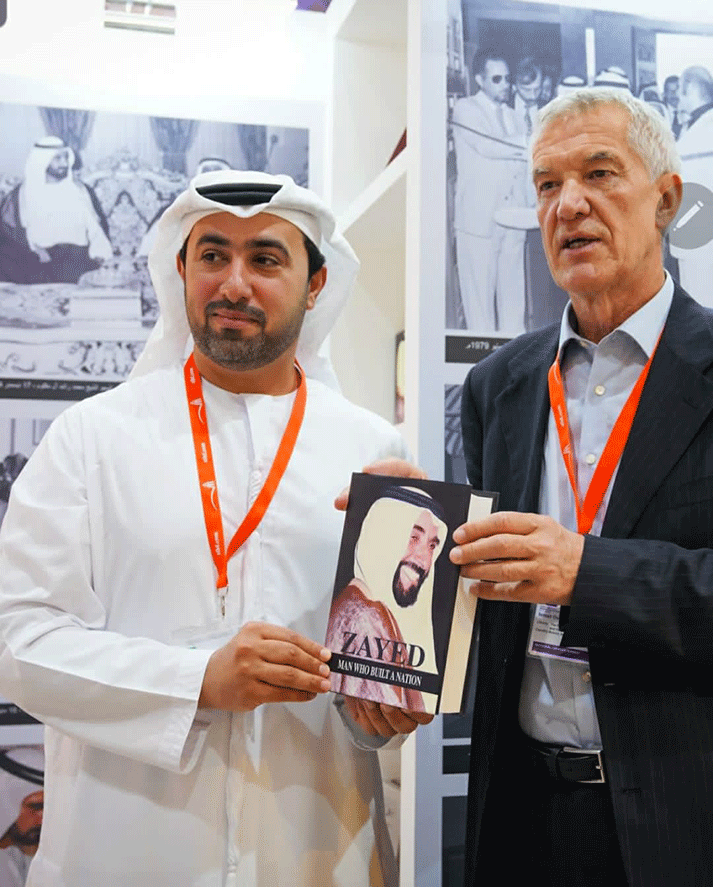
The National Library and Archives participates in the 41st edition of the Sharjah International Book Fair
H.E. Abdulla Majed: We are proud to meet Researchers and book-fair visitors’ demand for publications that document the glorious history of the UAE.
The National Library and Archives participates in the 41st edition of the Sharjah International Book Fair
The National Library and Archives participates in the forty-first edition of the Sharjah International Book Fair, which is considered an international cultural hub, held under the slogan "Spread the Word". The National Library and Archives participation in this major Emirati cultural event comes as a connecting bridge with the public benefiting from its various services and authentic documented publications on the history of the UAE.
The National Library and Archives’ participation through its platform that presents to the exhibition visitors the latest publications, including: (Ancient Desert Routes in Al Dhafra), (Tolerance in the UAE), (UAE History and Achievements), (The Andalusian Umayyads Diaspora), (The Arabic Language influence on Contemporary Spanish Names), (50 Words in Love of the UAE), and (Research papers of the National Library and Archives’ Second International Conference on Translation) in Arabic and English languages, (Zayed from Challenges to Union) in French, and (Qasr Al Hosn) in Spanish.
These publications are written by great renowned Authors and Researchers, such as: Ali Ahmed Al-Kindi Al-Marar, Abla Al-Nowais, Dr. Jayanti Maitra, Graeme H. Wilson ... and others, who are known for their diligence and accurate document-based historical information.
His Excellency Abdulla Majed Al Ali, Director General of the National Library and Archives, said: "As the UAE keenly strives to enhance the foundations of the knowledge society and economy, the 41st edition of the Sharjah International Book Fair is held among a large number of local, regional and international cultural events in the UAE. These major cultural activities indicate that science, culture, and knowledge are the pillars of modern society.
H.E. added: "We at the National Library and Archives join the UAE various emirates march towards the UAE (2071) centenary to assume its leading status among world countries in development and prosperity. We are keen to contribute to the dissemination and promotion of culture and knowledge to achieves sustainable development.
His Excellency stressed that the National Library and Archives takes pride in its publications displayed at its book-fair pavilion as they enrich it with a historical dimension of the UAE, which is sought by the bookfair visitors, and all interested in the glorious history and ancient heritage of the UAE.
H.E. also commended the National Library and Archives pavilion’s great turnout of researchers and bookfair visitors of various levels and affiliations.
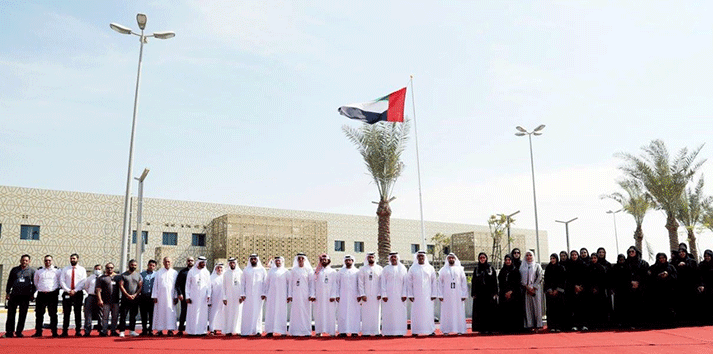
The National Library and Archives Hoisted the UAE Flag to fly high and bear witness to the glories of the homeland
The National Library and Archives Hoisted the UAE Flag to fly high and bear witness to the glories of the homeland, in an air of pride, patriotism and loyalty
In line with His Highness Sheikh Mohammed bin Rashid Al Maktoum, Vice President and Prime Minister of the UAE and Ruler of Dubai’s calling, the National Library and Archives celebrated the UAE flag hoisting, symbolizing the UAE sovereignty and national unity, loyalty and belonging, at its headquarters and its Center for Preservation and Restoration.
In the presence of the staff-members of both the National Library and Archives, and the Center for Preservation and Restoration, His Excellency Abdulla Majed Al Ali, Director General of the National Library and Archives, hoisted the UAE flag as a symbol of national unity and identity.
On this occasion, the National Library and Archives’ Director General stressed that its celebration of this dear National event reflects feelings of loyalty and belonging to the homeland, and its wise leadership that attaches great importance to the homeland and genuine interest in its people and spares no effort to document and preserve the memory of the nation.
The National Library and Archives Director General declared that Flag Day reflects the national pride in the UAE leadership, whose guidance and vision we follow towards greater pride, advancement, and progress, adhering to our national values and principles in which we take great pride, as we commit to maintaining the achieved national gains on all levels. The flag’s key role in promoting the values of loyalty and belonging to the homeland and its wise leadership, and preserving the national identity deserves from all UAE nationals and residents the utmost appreciation as a symbol of the homeland and its dignity.
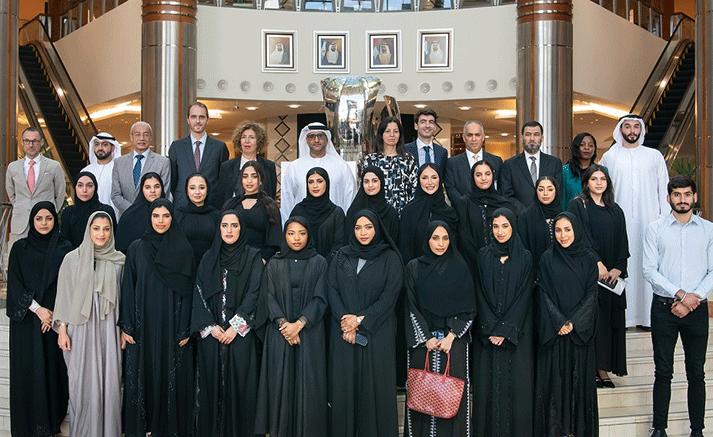
The National Library and Archives and the Arab Federation for Libraries and Information Conclude the 33rd Federation’s Conference hosted by Abu Dhabi
Participants thanked the UAE and its leadership for supporting and sponsoring the conference
The National Library and Archives and the Arab Federation for Libraries and Information Conclude the 33rd Federation’s Conference hosted by Abu Dhabi
The conference reviewed the experiences of the National library and Archives and major institutions in Oman, Libya, Sudan, Palestine... and others, in managing knowledge, contributing to knowledge economy and sustainable development.
The National Library and Archives and the Arab Federation for Libraries and Information concluded the 33rd Conference of the federation, which was hosted by the National Library and Archives in Abu Dhabi for 3 days under the theme: “Integration of National Information and Knowledge Institutions in the UAE: Libraries, Archives and Museums” The participants presented their thanks and appreciation to the United Arab Emirates and its leadership, the UAE National Library and Archives for the sponsorship and support of the conference and to all those who have contributed to its proceedings.
The recommendations of the conference focused on the importance of spreading informational awareness and culture among the Arab societies to ensure their transformation to information societies and the need to adopt effective programs in order to achieve this objective. The recommendations highlighted the need for the national libraries in the Arab countries and the public ones in particular to play their leading role in developing library practices, training their working staff members, laying down the necessary legislation, laws and standards for the Arab libraries, archives and museums and to follow-up their application and development; in order to keep abreast with the requirements of the digital age and enhance the ability of the Arab libraries, archives and museums to deal with the various crises they face by providing the necessary official and community support for their various programs and activities.
The recommendations also focused on the need to develop an Arab strategy to ensure the establishment of cooperation among the Arab libraries in general and the national libraries, archives centers and museums in particular. The recommendation stressed the importance of the role of libraries, archives and museums in achieving social responsibility and the goals of sustainable development in the Arab countries. Moreover there is a need to work on digitizing the Arab intellectual heritage published in various forms in order to make it available to researchers, and that attention must be given to the integration issue of the information and knowledge institutions in the Arab countries, the development of legislation, appropriate systems and tools in this field.
Recommendations also stressed the importance of information security in the Arab libraries, archives and museums to preserve their holdings and transfer them to future generations, in addition to the need to teach the integration of the information and knowledge institutions in syllabus programs of the library and information science and the specialized training courses in the field.
It is noteworthy that the conference held in the last two days 12 scientific sessions, which dealt with important topics and issues, such as: the inevitability of digital convergence for knowledge integration in order to build the collective memory for the future, knowledge integration and strategic alliances with emerging Arab information systems, and the museums of Kuwait and their integrative role as a modern education tool in addition to its role in preserving and documenting the history of the country, the foreseeing role of the national libraries in the era of information and communication technology. The Libyan National Library and its role in collecting and preserving the national heritage, the role of the National Library and Archives in the UAE in supporting scientific research among university students, and the role of national libraries, archives and museums in the smart cities, and the integration of the roles and tasks among the national libraries, archives and museums.
Some of the conference sessions were focused in measuring the level of awareness of library staff in the Egyptian academic libraries, the role of intellectual capital in supporting the integration of knowledge organizations, the role of the National Electronic Medical Library in the Sultanate of Oman in facing the information epidemic to create an information impenetrable society, and the role of the Sudanese libraries in supporting the Sudanese national development plans and visions.
The conference also shed lights on the role of building knowledge maps in supporting the sustainability of knowledge institutions, the role of modern technologies and artificial intelligence techniques in facilitating information services in cultural centers and the role of Non-fungible token technology (NFT) in preserving and disseminating documentary heritage and open data in King Fahd National Library.
Among the research papers the conference discussed were: comprehensive knowledge platforms and their role in supporting the UAE strategy in applying NFT technology in preparing museum manuscript directories, managing and investing digital assets in international and local museums, archive policies and legislation in banking institutions in Sudan, and the role of repositories in supporting the integration of information systems and tools, cooperation between national information institutions and their role in preserving heritage and the role of the National Library of Kuwait in preserving, documenting and protecting national heritage, government archive, the reality and hopes and the impact of the activities of national libraries in the Arab Gulf states in enhancing information awareness of beneficiaries.
On the third day of the conference, the sessions also focused on presenting the new publications of the Arab Federation for Libraries and Information, including standards and directories, and their importance.
The participants welcomed the announcement by the CEO of the Libraries Commission in Saudi Arabia that the 34th Conference of the Federation would be held next year in Saudi Arabia.
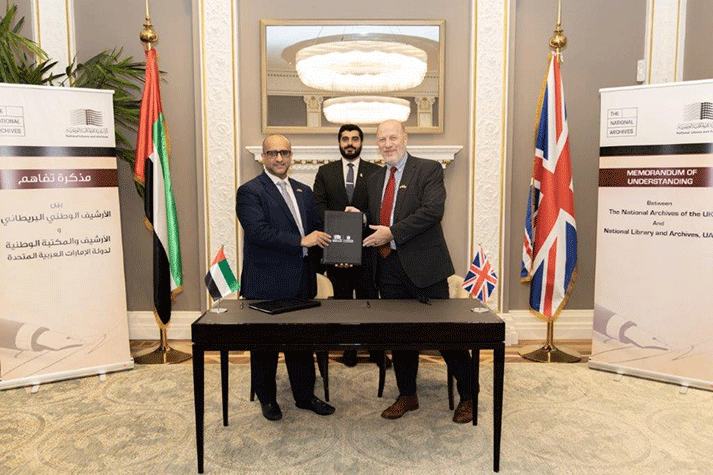
The National Library and Archives and the Arab Federation for Libraries and Information Conclude the 33rd Federation’s Conference hosted by Abu Dhabi
Participants thanked the UAE and its leadership for supporting and sponsoring the conference
The National Library and Archives and the Arab Federation for Libraries and Information Conclude the 33rd Federation’s Conference hosted by Abu Dhabi
The conference reviewed the experiences of the National library and Archives and major institutions in Oman, Libya, Sudan, Palestine... and others, in managing knowledge, contributing to knowledge economy and sustainable development.
The National Library and Archives and the Arab Federation for Libraries and Information concluded the 33rd Conference of the federation, which was hosted by the National Library and Archives in Abu Dhabi for 3 days under the theme: “Integration of National Information and Knowledge Institutions in the UAE: Libraries, Archives and Museums” The participants presented their thanks and appreciation to the United Arab Emirates and its leadership, the UAE National Library and Archives for the sponsorship and support of the conference and to all those who have contributed to its proceedings.
The recommendations of the conference focused on the importance of spreading informational awareness and culture among the Arab societies to ensure their transformation to information societies and the need to adopt effective programs in order to achieve this objective. The recommendations highlighted the need for the national libraries in the Arab countries and the public ones in particular to play their leading role in developing library practices, training their working staff members, laying down the necessary legislation, laws and standards for the Arab libraries, archives and museums and to follow-up their application and development; in order to keep abreast with the requirements of the digital age and enhance the ability of the Arab libraries, archives and museums to deal with the various crises they face by providing the necessary official and community support for their various programs and activities.
The recommendations also focused on the need to develop an Arab strategy to ensure the establishment of cooperation among the Arab libraries in general and the national libraries, archives centers and museums in particular. The recommendation stressed the importance of the role of libraries, archives and museums in achieving social responsibility and the goals of sustainable development in the Arab countries. Moreover there is a need to work on digitizing the Arab intellectual heritage published in various forms in order to make it available to researchers, and that attention must be given to the integration issue of the information and knowledge institutions in the Arab countries, the development of legislation, appropriate systems and tools in this field.
Recommendations also stressed the importance of information security in the Arab libraries, archives and museums to preserve their holdings and transfer them to future generations, in addition to the need to teach the integration of the information and knowledge institutions in syllabus programs of the library and information science and the specialized training courses in the field.
It is noteworthy that the conference held in the last two days 12 scientific sessions, which dealt with important topics and issues, such as: the inevitability of digital convergence for knowledge integration in order to build the collective memory for the future, knowledge integration and strategic alliances with emerging Arab information systems, and the museums of Kuwait and their integrative role as a modern education tool in addition to its role in preserving and documenting the history of the country, the foreseeing role of the national libraries in the era of information and communication technology. The Libyan National Library and its role in collecting and preserving the national heritage, the role of the National Library and Archives in the UAE in supporting scientific research among university students, and the role of national libraries, archives and museums in the smart cities, and the integration of the roles and tasks among the national libraries, archives and museums.
Some of the conference sessions were focused in measuring the level of awareness of library staff in the Egyptian academic libraries, the role of intellectual capital in supporting the integration of knowledge organizations, the role of the National Electronic Medical Library in the Sultanate of Oman in facing the information epidemic to create an information impenetrable society, and the role of the Sudanese libraries in supporting the Sudanese national development plans and visions.
The conference also shed lights on the role of building knowledge maps in supporting the sustainability of knowledge institutions, the role of modern technologies and artificial intelligence techniques in facilitating information services in cultural centers and the role of Non-fungible token technology (NFT) in preserving and disseminating documentary heritage and open data in King Fahd National Library.
Among the research papers the conference discussed were: comprehensive knowledge platforms and their role in supporting the UAE strategy in applying NFT technology in preparing museum manuscript directories, managing and investing digital assets in international and local museums, archive policies and legislation in banking institutions in Sudan, and the role of repositories in supporting the integration of information systems and tools, cooperation between national information institutions and their role in preserving heritage and the role of the National Library of Kuwait in preserving, documenting and protecting national heritage, government archive, the reality and hopes and the impact of the activities of national libraries in the Arab Gulf states in enhancing information awareness of beneficiaries.
On the third day of the conference, the sessions also focused on presenting the new publications of the Arab Federation for Libraries and Information, including standards and directories, and their importance.
The participants welcomed the announcement by the CEO of the Libraries Commission in Saudi Arabia that the 34th Conference of the Federation would be held next year in Saudi Arabia.
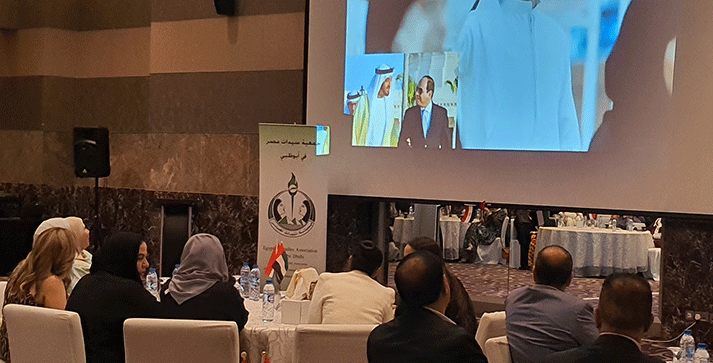
The National Library and Archives and the Arab Federation for Libraries and Information Conclude the 33rd Federation’s Conference hosted by Abu Dhabi
Participants thanked the UAE and its leadership for supporting and sponsoring the conference
The National Library and Archives and the Arab Federation for Libraries and Information Conclude the 33rd Federation’s Conference hosted by Abu Dhabi
The conference reviewed the experiences of the National library and Archives and major institutions in Oman, Libya, Sudan, Palestine... and others, in managing knowledge, contributing to knowledge economy and sustainable development.
The National Library and Archives and the Arab Federation for Libraries and Information concluded the 33rd Conference of the federation, which was hosted by the National Library and Archives in Abu Dhabi for 3 days under the theme: “Integration of National Information and Knowledge Institutions in the UAE: Libraries, Archives and Museums” The participants presented their thanks and appreciation to the United Arab Emirates and its leadership, the UAE National Library and Archives for the sponsorship and support of the conference and to all those who have contributed to its proceedings.
The recommendations of the conference focused on the importance of spreading informational awareness and culture among the Arab societies to ensure their transformation to information societies and the need to adopt effective programs in order to achieve this objective. The recommendations highlighted the need for the national libraries in the Arab countries and the public ones in particular to play their leading role in developing library practices, training their working staff members, laying down the necessary legislation, laws and standards for the Arab libraries, archives and museums and to follow-up their application and development; in order to keep abreast with the requirements of the digital age and enhance the ability of the Arab libraries, archives and museums to deal with the various crises they face by providing the necessary official and community support for their various programs and activities.
The recommendations also focused on the need to develop an Arab strategy to ensure the establishment of cooperation among the Arab libraries in general and the national libraries, archives centers and museums in particular. The recommendation stressed the importance of the role of libraries, archives and museums in achieving social responsibility and the goals of sustainable development in the Arab countries. Moreover there is a need to work on digitizing the Arab intellectual heritage published in various forms in order to make it available to researchers, and that attention must be given to the integration issue of the information and knowledge institutions in the Arab countries, the development of legislation, appropriate systems and tools in this field.
Recommendations also stressed the importance of information security in the Arab libraries, archives and museums to preserve their holdings and transfer them to future generations, in addition to the need to teach the integration of the information and knowledge institutions in syllabus programs of the library and information science and the specialized training courses in the field.
It is noteworthy that the conference held in the last two days 12 scientific sessions, which dealt with important topics and issues, such as: the inevitability of digital convergence for knowledge integration in order to build the collective memory for the future, knowledge integration and strategic alliances with emerging Arab information systems, and the museums of Kuwait and their integrative role as a modern education tool in addition to its role in preserving and documenting the history of the country, the foreseeing role of the national libraries in the era of information and communication technology. The Libyan National Library and its role in collecting and preserving the national heritage, the role of the National Library and Archives in the UAE in supporting scientific research among university students, and the role of national libraries, archives and museums in the smart cities, and the integration of the roles and tasks among the national libraries, archives and museums.
Some of the conference sessions were focused in measuring the level of awareness of library staff in the Egyptian academic libraries, the role of intellectual capital in supporting the integration of knowledge organizations, the role of the National Electronic Medical Library in the Sultanate of Oman in facing the information epidemic to create an information impenetrable society, and the role of the Sudanese libraries in supporting the Sudanese national development plans and visions.
The conference also shed lights on the role of building knowledge maps in supporting the sustainability of knowledge institutions, the role of modern technologies and artificial intelligence techniques in facilitating information services in cultural centers and the role of Non-fungible token technology (NFT) in preserving and disseminating documentary heritage and open data in King Fahd National Library.
Among the research papers the conference discussed were: comprehensive knowledge platforms and their role in supporting the UAE strategy in applying NFT technology in preparing museum manuscript directories, managing and investing digital assets in international and local museums, archive policies and legislation in banking institutions in Sudan, and the role of repositories in supporting the integration of information systems and tools, cooperation between national information institutions and their role in preserving heritage and the role of the National Library of Kuwait in preserving, documenting and protecting national heritage, government archive, the reality and hopes and the impact of the activities of national libraries in the Arab Gulf states in enhancing information awareness of beneficiaries.
On the third day of the conference, the sessions also focused on presenting the new publications of the Arab Federation for Libraries and Information, including standards and directories, and their importance.
The participants welcomed the announcement by the CEO of the Libraries Commission in Saudi Arabia that the 34th Conference of the Federation would be held next year in Saudi Arabia.
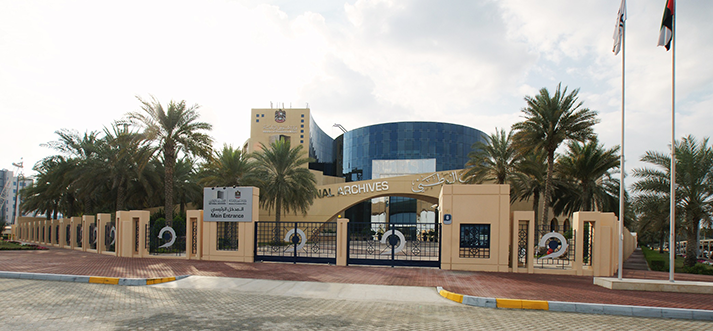
The National Library and Archives and the Arab Federation for Libraries and Information Conclude the 33rd Federation’s Conference hosted by Abu Dhabi
Participants thanked the UAE and its leadership for supporting and sponsoring the conference
The National Library and Archives and the Arab Federation for Libraries and Information Conclude the 33rd Federation’s Conference hosted by Abu Dhabi
The conference reviewed the experiences of the National library and Archives and major institutions in Oman, Libya, Sudan, Palestine... and others, in managing knowledge, contributing to knowledge economy and sustainable development.
The National Library and Archives and the Arab Federation for Libraries and Information concluded the 33rd Conference of the federation, which was hosted by the National Library and Archives in Abu Dhabi for 3 days under the theme: “Integration of National Information and Knowledge Institutions in the UAE: Libraries, Archives and Museums” The participants presented their thanks and appreciation to the United Arab Emirates and its leadership, the UAE National Library and Archives for the sponsorship and support of the conference and to all those who have contributed to its proceedings.
The recommendations of the conference focused on the importance of spreading informational awareness and culture among the Arab societies to ensure their transformation to information societies and the need to adopt effective programs in order to achieve this objective. The recommendations highlighted the need for the national libraries in the Arab countries and the public ones in particular to play their leading role in developing library practices, training their working staff members, laying down the necessary legislation, laws and standards for the Arab libraries, archives and museums and to follow-up their application and development; in order to keep abreast with the requirements of the digital age and enhance the ability of the Arab libraries, archives and museums to deal with the various crises they face by providing the necessary official and community support for their various programs and activities.
The recommendations also focused on the need to develop an Arab strategy to ensure the establishment of cooperation among the Arab libraries in general and the national libraries, archives centers and museums in particular. The recommendation stressed the importance of the role of libraries, archives and museums in achieving social responsibility and the goals of sustainable development in the Arab countries. Moreover there is a need to work on digitizing the Arab intellectual heritage published in various forms in order to make it available to researchers, and that attention must be given to the integration issue of the information and knowledge institutions in the Arab countries, the development of legislation, appropriate systems and tools in this field.
Recommendations also stressed the importance of information security in the Arab libraries, archives and museums to preserve their holdings and transfer them to future generations, in addition to the need to teach the integration of the information and knowledge institutions in syllabus programs of the library and information science and the specialized training courses in the field.
It is noteworthy that the conference held in the last two days 12 scientific sessions, which dealt with important topics and issues, such as: the inevitability of digital convergence for knowledge integration in order to build the collective memory for the future, knowledge integration and strategic alliances with emerging Arab information systems, and the museums of Kuwait and their integrative role as a modern education tool in addition to its role in preserving and documenting the history of the country, the foreseeing role of the national libraries in the era of information and communication technology. The Libyan National Library and its role in collecting and preserving the national heritage, the role of the National Library and Archives in the UAE in supporting scientific research among university students, and the role of national libraries, archives and museums in the smart cities, and the integration of the roles and tasks among the national libraries, archives and museums.
Some of the conference sessions were focused in measuring the level of awareness of library staff in the Egyptian academic libraries, the role of intellectual capital in supporting the integration of knowledge organizations, the role of the National Electronic Medical Library in the Sultanate of Oman in facing the information epidemic to create an information impenetrable society, and the role of the Sudanese libraries in supporting the Sudanese national development plans and visions.
The conference also shed lights on the role of building knowledge maps in supporting the sustainability of knowledge institutions, the role of modern technologies and artificial intelligence techniques in facilitating information services in cultural centers and the role of Non-fungible token technology (NFT) in preserving and disseminating documentary heritage and open data in King Fahd National Library.
Among the research papers the conference discussed were: comprehensive knowledge platforms and their role in supporting the UAE strategy in applying NFT technology in preparing museum manuscript directories, managing and investing digital assets in international and local museums, archive policies and legislation in banking institutions in Sudan, and the role of repositories in supporting the integration of information systems and tools, cooperation between national information institutions and their role in preserving heritage and the role of the National Library of Kuwait in preserving, documenting and protecting national heritage, government archive, the reality and hopes and the impact of the activities of national libraries in the Arab Gulf states in enhancing information awareness of beneficiaries.
On the third day of the conference, the sessions also focused on presenting the new publications of the Arab Federation for Libraries and Information, including standards and directories, and their importance.
The participants welcomed the announcement by the CEO of the Libraries Commission in Saudi Arabia that the 34th Conference of the Federation would be held next year in Saudi Arabia.